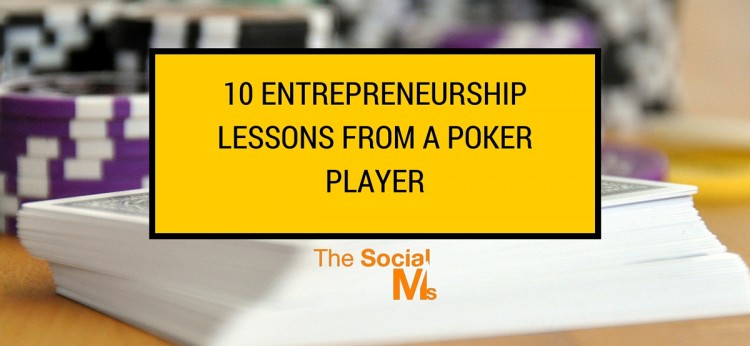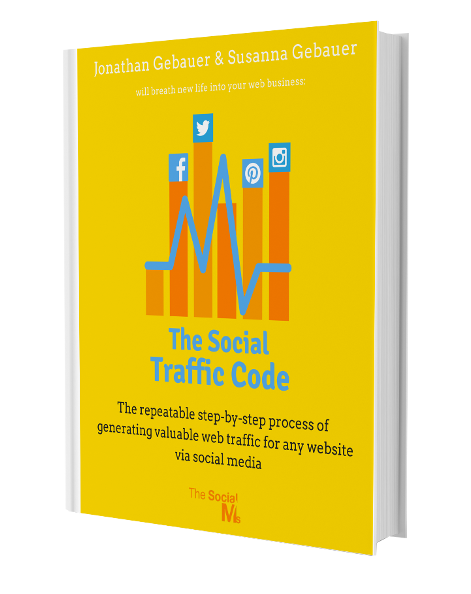I’m an entrepreneur. I also love playing poker – and I believe that poker as a game holds many lessons that are valuable for almost every aspect of life. That includes personal life and business.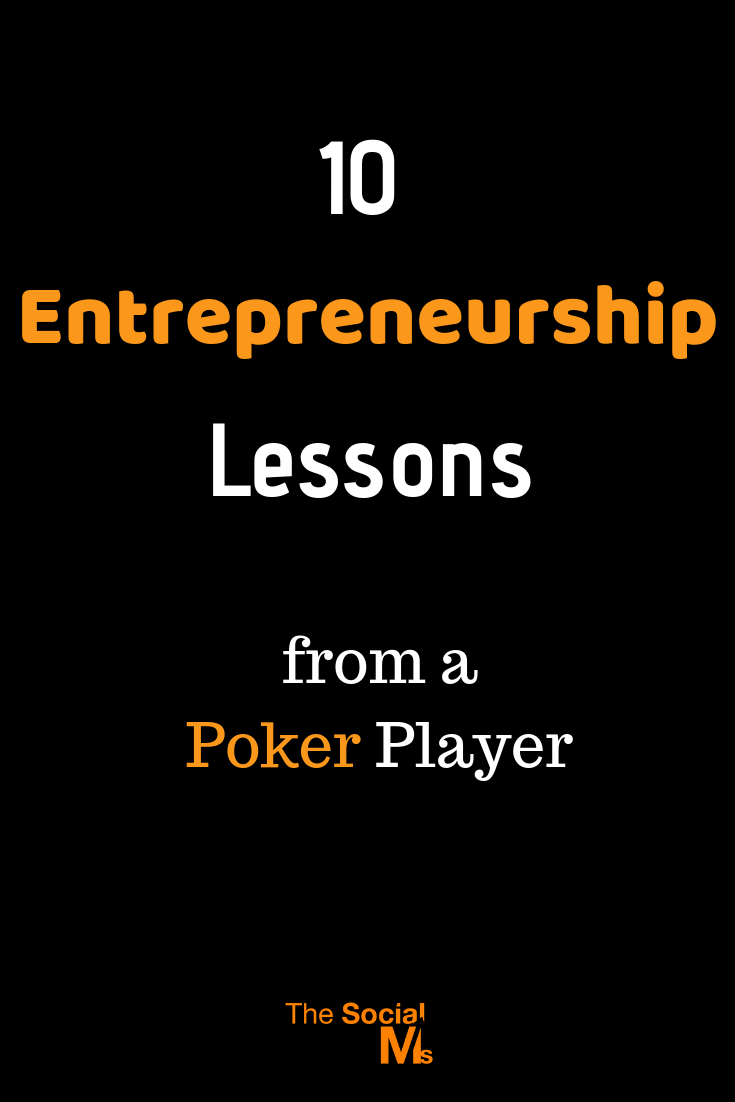
Now, I’m not a great poker player – I lack both the experience and the bankroll you need to become a great player. But I guess I’m ok – and I have one advantage: I studied math, and that does give me a slight edge when evaluating hands. I’m not a pro player – just an amateur who loves to play whenever he finds a game that is within his limits. I play both variants: tournament and cash game.
I only play one variant of poker – Texas Hold’em No Limit. If you are unfamiliar with poker in general or with Texas Hold’em, here are the rules in a nutshell:
- First: The first and second player in a round have to play the small and the big blind (a small bet)
- Each player is dealt two pocket cards – which he keeps to himself.
- Then the first round of betting takes place; the minimum bet is the big blind. If nobody raises the blind, the player who paid the big blind is automatically in the game. If you don’t pay the bet, you’re out.
- After the first round of betting, three cards are dealt openly visible on the table. These are called the Flop and, like all cards that are on the board, are valid for all players still in the game.
- This is followed by another round of betting, then another open card (the Turn), another round of betting, then another card (the River), and the last round of betting.
- The winner of the rounds pot is who is either the last player in the game or the player with the highest hand consisting of 5 cards. This hand can consist of up to all 5 cards from the board – although this is just theoretical.
- The order of the possible hands is the following – highest card(s), one pair, two pair, set of three, straight (five in a row), flush (five of one color), full house (set of three + a pair), set of four, straight flush (five in a row of one color).
Poker is a little like chess – while the rules are relatively simple, the game itself is very hard to master. The rules are even simpler than in chess – but poker is even more difficult to master because there are even more components to take into account – like bluffing, evaluating your opponents, playing styles, statistics, etc…
Before you read on - we have various resources that show you exactly how to use social networks to gain massive traffic and leads. For instance, check out the following:
FREE Step-by-Step Twitter Marketing GuideFREE Pinterest Marketing Ebook
Poker also is a lot different than chess – because chess doesn’t involve chance. And chess doesn’t involve betting (or investing) after every move you make. There are no perfect solutions in poker – even the weakest hand can win a big pot, and even the strongest hand (two Aces) might lose, and very often does.
So, here we go – here are 10 lessons I learned from poker that are highly valuable for entrepreneurs.
#1 Patience – Your Time Will Come
Poker is a game of patience – very often you simply need to wait. Especially in Texas Hold’em, where in many situations you will probably just fold (throw away) your starting hand without seeing the flop – at least when there are more than 6 players at the table. Your starting hand might not be strong enough, or you are simply up against a player who is betting too high before the flop to legitimate moving in with lower starting hands. You need to wait for your chance. You need to wait for a starting hand that has high chances of winning.
In poker that often means waiting for better starting hands. And this may be the most important lesson you can take away from the game: Examine your starting situation, and don’t bet everything before you are sure enough that your chances of winning are high enough to legitimize your bet. Probability says that better hands will come if you wait long enough.
#2 Bluffing With An Out
If you haven’t been stuck under a rock for most of your life, you will know that bluffing is a big part of poker. Bluffing means betting on a hand that isn’t good and probably won’t win. And by betting on this hand, you represent a winning hand. Your opposing player then has the option to either call your bluff (therefore not believing you and probably winning the pot) or folding (giving you all the money that is already on the table).
Here is the thing – since the cards in Hold’em are being dealt in between betting rounds, your hand can still improve. So if you bluff early in the game, your hand might still win if you get good cards on the river or turn. Depending on the hand you already hold the chances of winning the pot may therefore not be so small after all. For instance, when you hold an Ace of Spades and the three cards of the flop are three spades, any spade on the Turn or River will mean that you have a high hand – probably the highest possible.
The chances of getting that hand are relatively high (around 30 – 35 %) – what would be the wisest decision now? Very often the most sensible decision is to bet: Your opponent will either believe you already have a flush and give you all the money that is already in the pot. Or he may not believe you and call you – but even if everything you have is in the pot, you might still win (giving yourself 2 opportunities to win instead of 1). While you still have to evaluate whether the situation and your opponents style of play make this action sensible – you have a lot higher chances of winning when you time your bluffs to situations where you could actually make a hand!
This is bluffing with outs (opportunities that may come with later cards). And this is a lesson that many should take into account for their business life: I have seen many startups that simply couldn’t fulfill the promises they made to clients or users – but some had an option of fulfilling these promises later and some didn’t. The ones that kept the option to fulfill their promises had a chance to win the game, even when clients would ask them when they would make good on their promises.
(Both strategies might sound like bad business, but the reality is: When you are playing the startup game, you might simply not have a choice.)
Hey, before you read on - we have in various FREE in-depth guides on similar topics that you can download. For this post, check out:
FREE workbook: CREATE AWESOME BLOG POSTSFREE Beginner's Guide: START A BLOG
#3 You are (Almost) Never Safe
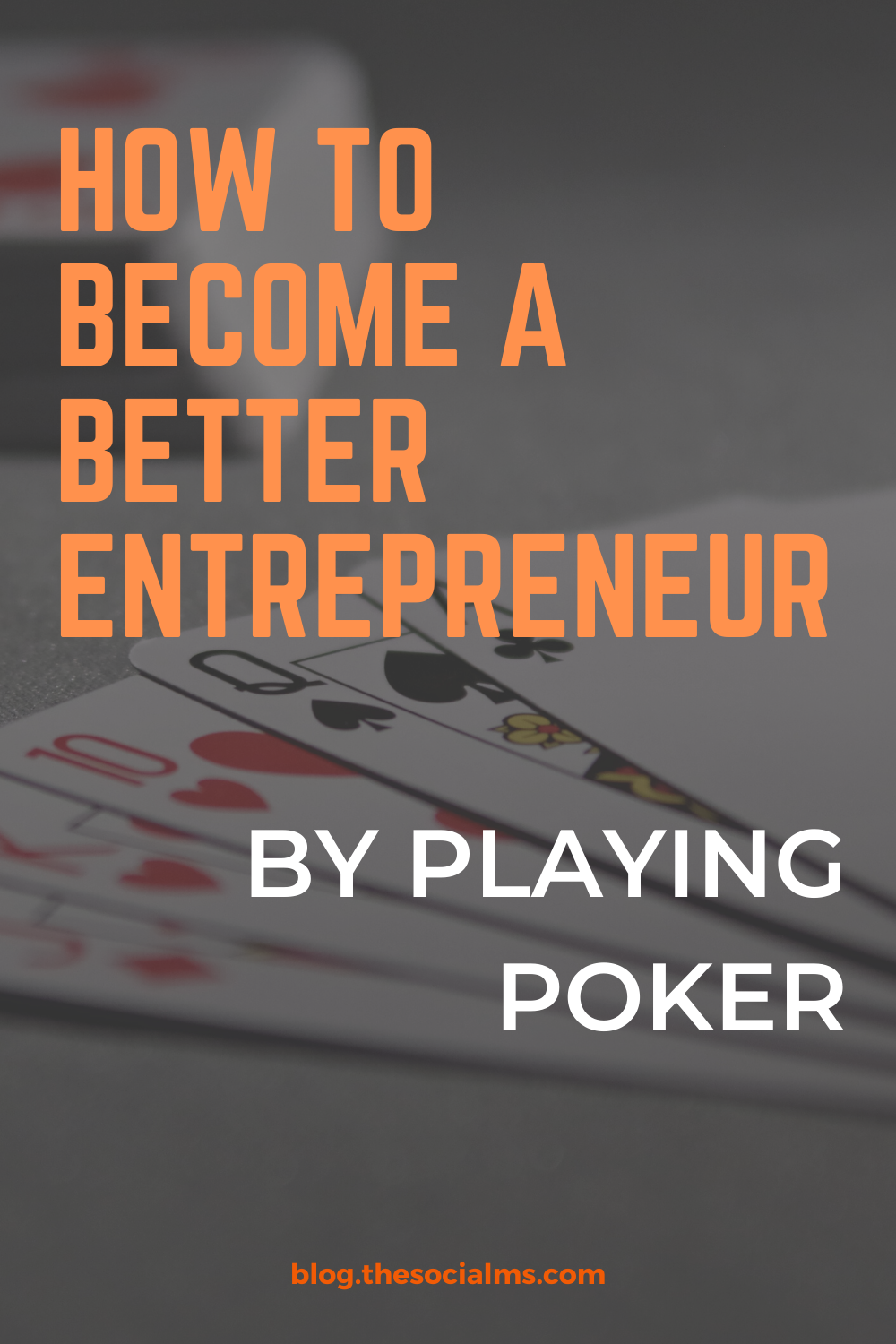 There are no two cards in no-limit hold’em that will automatically win the pot. Even if you get 2 Aces to start with – you are not safe. This is something that also holds true for your life as an entrepreneur. At least, when you are starting out. Even with the best product in the world, you may still lose, and even the best situation can turn sour. The lesson here is to stay vigilant – what are your competitors doing? What are your employees doing?
There are no two cards in no-limit hold’em that will automatically win the pot. Even if you get 2 Aces to start with – you are not safe. This is something that also holds true for your life as an entrepreneur. At least, when you are starting out. Even with the best product in the world, you may still lose, and even the best situation can turn sour. The lesson here is to stay vigilant – what are your competitors doing? What are your employees doing?
In Hold’em you might be the favorite to win a round with two aces starting out – but that doesn’t mean that it will stay this way after the flop – the situation can change completely in the middle of the game. Just like in real life. Cards aren’t dealt to make you feel better.
#4 The Less Obvious Starting Hands Make More Money
As I said before – when you have two aces starting out, you might have the highest chances to win. But that doesn’t mean that you have the highest chances to win big! With two Aces, you might have the highest possible pair – but your chances of getting a higher hand are relatively small. Sure, you can get a flush or a straight – or a set of three (or even four). But the chances are slimmer than with other starting hands, and you might just be stuck with your pair.
So when someone does make a higher hand – the chances are that you will not just lose, but lose a lot. One of the secrets to winning big pots in poker is to allow yourself to play the pocket cards that will allow you to make big hands. It’s a game of probability and clever betting: Try to get in cheap with a hand like 5 and 6 of the same color and, therefore, maximize your chance of making a straight or a flush. When you do, and someone else makes the highest pair (or is running on a pocket pair), that’s when you have a chance to win big.
Sure – this may not work for 90% of the time – but when it does, it’s worth it. You still have to bet right to win big, but the important thing is: It’s a strategic element of winning more than losing.
In entrepreneurship this is not just an important lesson to keep in mind – it is one of the most important things to keep in mind: The less obvious a business opportunity is – the higher is the risk of losing, but also the chance of winning big.
The strategy is, therefore, to keep yourself protected when going after this kind of opportunity.
#5 Trust Your Intuition
Poker is very complex – too complex ever to know everything. Every game you play is different. A situation will never be exactly the same as it has been the last time. Even if the same cards are dealt, it is still not the same – maybe similar, but not the same. Mood and personality of the participating players are all factors influencing the game and how you should play it.
This complexity means that as a player you will need to learn to trust your intuition – at least sometimes. Because your intuition is a very powerful tool: Your intuition can warn you that your opponent has four of a kind – even though your brain tells you that this is highly unlikely.
Intuition doesn’t replace logic, math or sensibility, but it is another thing you have in your toolbox. In entrepreneurship, this is highly important as well.
#6 Learn To Gamble
In poker there is almost always a risk – so when you play a hand you are never safe (see #3). As a result, you always have to gamble when playing poker. But gambling – when done right – isn’t about believing in luck. Gambling is about evaluating probabilities and ROI in the case you win.
In poker, this means to find a good relation between your odds of winning and your bet – and in entrepreneurship this is even more drastic. Drew Houston – a founder of Dropbox – put it this way: “Don’t worry about failure. You only have to be right once.”
This is only true if you are only playing the biggest opportunities that you can think of. But in any case – learn to estimate the size of the opportunity and evaluate the risk accordingly.
#7 “Never Give Up” Is Bad Advice
The person who said: “Never give up,” almost definitely wasn’t a poker player. In poker, you should play your hand as long as you have a chance to win with it (bluffing included). But sometimes (actually most of the time) you are simply up against the best hand possible or a player that simply won’t fold with any hand. In this case, the only sensible move for you is to throw your cards away and minimize your losses.
In entrepreneurship, it’s the same thing. When your hand isn’t going to win – get away from it. Because you need your chips to win the next hand and to win big with it.
Learn to drive engagement, traffic, leads, and customers from social media with “The Social Traffic Code!”
#8 “Never Give Up” Is Good Advice
Ok, I just told you that it is bad advice, right? But in a different sense it is also good advice: Even if your current hand is bad, you can still be a good poker player. So throw your hand away – but don’t stop playing. And even if you are a bad poker player right now – continue playing and become better.
Entrepreneurship is the same – all that you can learn will go into your future success. Even if you don’t win today – or tomorrow. Entrepreneurship is a way of life – you signed up for it. Don’t believe for a second that you don’t have a chance to go big because you failed once. Get up, get better, continue until you start winning.
#9 Never Play Poker On Tilt
Tilt in poker is when you had bad luck and lost a lot – so much that it affects the way you play in a bad way. When you are trying to win back your losses instead of making sensible decisions. Making unreasonable decisions – bluffing every single game. Calling another player simply because he “cannot always have the best hand.”
This sometimes happens to the best poker players out there. And every single one of them will tell you that this is the time to take a break.
Tilt happens to entrepreneurs as well. And they simply need to go to sleep before making decisions. Or take a vacation. Go running. Take a cold shower.
Tilt is born out of frustration – and frustrated people make bad decisions. So when frustration kicks in – take a break. Start taking your time with every decision you make. Don’t do something just because “something has to work.”
#10 Public Image Determines What You Can Do Or Can’t Do
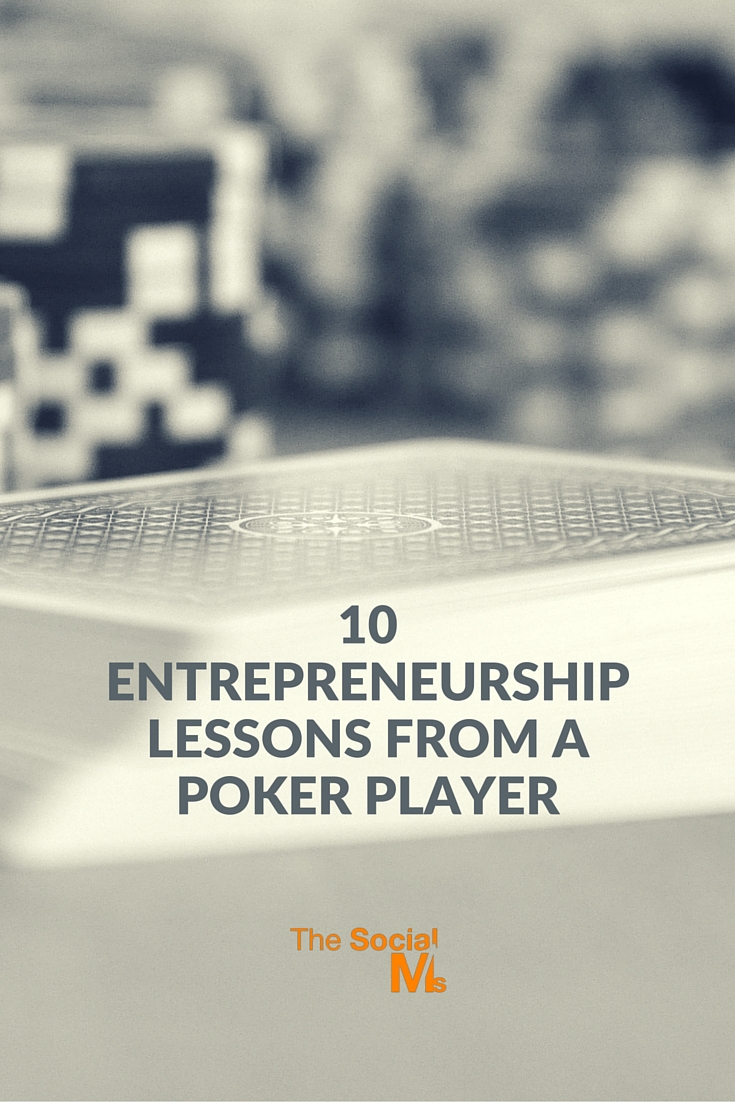 The best poker players know that their biggest wins happen when they are unpredictable. A lot of what you can get away with on a poker table depends on how others on that table see you. If you play very few hands and whenever you get to the showdown (when you have to show your hand) you have the strongest hand, you can start bluffing more often. Because no one expects you to bluff.
The best poker players know that their biggest wins happen when they are unpredictable. A lot of what you can get away with on a poker table depends on how others on that table see you. If you play very few hands and whenever you get to the showdown (when you have to show your hand) you have the strongest hand, you can start bluffing more often. Because no one expects you to bluff.
The opposite is true as well – if everyone expects you to bluff, your chances of winning a big pot with a big hand are bigger. Because no one expects you to have a hand.
The same is true in business. How others see you is a lot more important than how you actually are. Knowing your image and how you appear to others is what gives you more options.
Final Words
Here we are. These are 10 entrepreneurship lessons I learned from playing poker. I could’ve made it to 20 or even more. But these are what came to my mind first.
This isn’t just a fun post. Poker is a lot closer to entrepreneurship than you might think. The reason for that is that it is based on ROI. You invest money – real money – into a hand, and once in a while, it pays off. The trick is making more money than you lose.
This makes a poker game very alike to the entrepreneurship world. So as for final advice: Every entrepreneur should learn to play poker.
So, do you agree? What are your lessons from playing poker?

